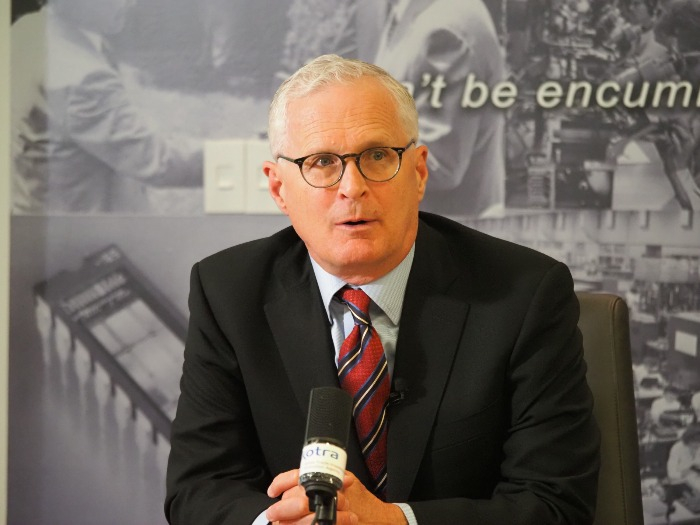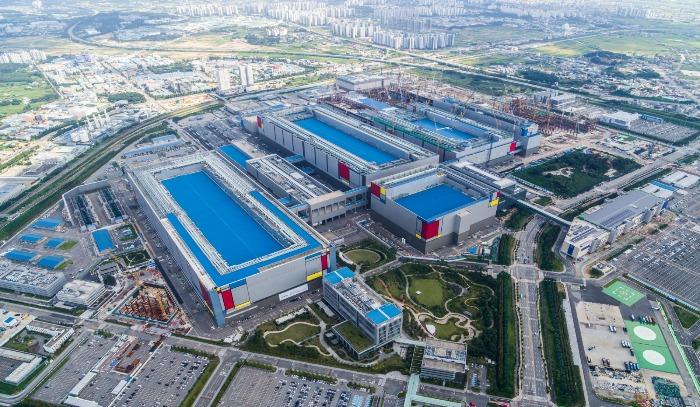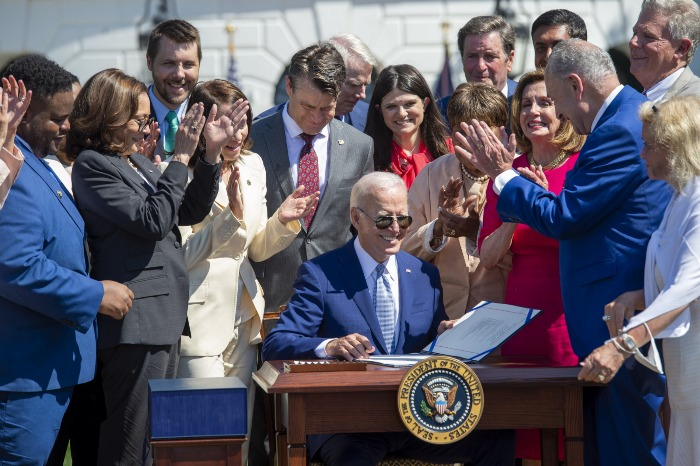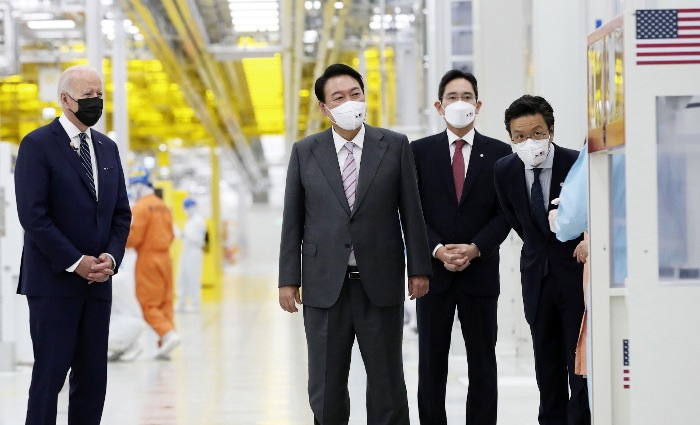US chipmaking association chief stresses Chip 4 Alliance not about China
SIA President and CEO John Neuffer warned that the heat of the debate around the alliance could undermine its constructiveness
By Sep 10, 2022 (Gmt+09:00)
LG Chem to sell water filter business to Glenwood PE for $692 million


KT&G eyes overseas M&A after rejecting activist fund's offer


Mirae Asset to be named Korea Post’s core real estate fund operator


StockX in merger talks with Naver’s online reseller Kream


Meritz backs half of ex-manager’s $210 mn hedge fund



John Neuffer, president and CEO of the United States Semiconductor Industry Association (SIA), visited South Korea earlier this week on the primary leg of his first Asia tour in more than two and a half years before heading off to Japan on Wednesday.
Neuffer said South Korea is a hugely important part of the global semiconductor supply chain, accounting for two-thirds of the memory semiconductor market worldwide.
The Washington D.C. veteran added that South Korea is also a significant player in contract manufacturing for chips.
The SIA is a trade association and lobbying group founded in 1977, which represents the US chipmaking industry.
While most of its members are headquartered in the US, there are 15 international members of the trade consortium. Electronics giant Samsung Electronics Co. and chipmaker SK Hynix Inc. are the members from South Korea.
During a Sept. 6 interview with The Korea Economic Daily, Neuffer stressed that the so-called Chip 4 alliance, proposed by Washington in March, is not about countering China’s rise in the chipmaking industry.
Neuffer said it is about benefiting the “four big players who have shared interest” in the complex semiconductor supply chain.
When asked if South Korea joining the alliance could irk the Chinese government, Neuffer said, “We certainly don’t want that to happen.”
South Korea’s participation in the alliance has been widely debated by industry experts and policymakers as China remains the biggest market for the country’s semiconductor companies.
According to data from the Korea International Trade Association (KITA), Mainland China and Hong Kong account for around 60% of Korea’s semiconductor exports.
Not only that, the world’s largest chipmaker Samsung Electronics has its only overseas NAND flash memory chip plant in the western Chinese city of Xi’an.

Still, Neuffer said he believes “there seems to be a lot of hyperventilating,” and that there is a need to reduce the heat.
“The intensity of the debate could undermine the constructiveness,” the 64-year-old cautioned.
ALLIANCE ALLEGIANCE
The Chip 4 alliance is a semiconductor partnership among countries proposed by the United States, namely South Korea, Japan and Taiwan.
The alliance proposal came on the sidelines of the CHIPS and Science Act, which US President Joe Biden signed into law on Aug. 9.
The act provides $280 billion in new funding to boost domestic research and manufacturing of semiconductors in the US and will channel more than $52 billion into researching semiconductors and other scientific research.
Experts and industry insiders view the primary aim of the CHIPS Plus Act is to counter China.
The new bill states clear guardrails for firms considering expanding into China.
Chip manufacturers that want to take subsidies and tax credits from Washington cannot make new investments in “countries of concern” for at least a decade to produce chips with 28-nanometer circuits or smaller.
The 28 nano or smaller processing nodes encompass nearly all chip production lines.
Not surprisingly, Beijing has lobbied against the bill and criticized it as being “reminiscent of a Cold War mentality.”
Despite Beijing’s pledge to invest $1.4 trillion between 2020 and 2025 in high-tech industries including semiconductors, the country still lags in manufacturing high-end logic chips.
The US is an unmatched leader in chip design while both the US and Japan excel in toolmaking. South Korea and Taiwan dominate the high-end chipmaking industry.

UNDERSTANDING WASHINGTON
“It’s been very impressive to watch the Korean companies expand their presence in Washington to better understand how it works,” the former Deputy Assistant US Trade Representative (USTR) for Japan said.
With the CHIPS Act, there has been some effort to make it all about companies headquartered in the US, he explained, but to no avail.
The CHIPS Act funds are available to both US and non-US companies, which Neuffer said shows that American policymakers are not being protectionistic.
Neuffer thinks that better government relations strategies by Korean conglomerates have led to the outcome, adding that they have become more sophisticated in dealing with Washington in recent years.
On Feb. 16, Samsung Electronics America announced it hired former US Ambassador to South Korea Mark Lippert as its public relations chief, in an apparent move to better respond to uncertainties surrounding policy changes in Washington.
Lippert, whose tenure as the top US envoy in South Korea was widely praised at home and on the peninsula, began his term at Samsung on March 1.
GROWING SIGNIFICANCE
The global semiconductor market size was $527.88 billion in 2021 and is projected to grow to $1,380.79 billion by 2029, according to Fortune Business Insights.
“Just look around us, we are surrounded by technology made possible by semiconductors,” Neuffer said with a smile.

The US endeavor on building a semiconductor partnership extends to the highest level.
President Biden visited South Korea in May for three days, which included a tour of Samsung Electronic’s complex in Pyeongtaek, the world’s largest semiconductor plant.
After the tour guided by the electronics giant’s Vice Chairman Jay Y. Lee, Biden and his South Korean counterpart Yoon Suk-yeol emphasized the two countries' iron-clad commitment to an economic security alliance.
Write to Jee Abbey Lee at jal@hankyung.com
-
 Business & PoliticsYoon, Biden highlight 'economic security alliance' following Samsung tour
Business & PoliticsYoon, Biden highlight 'economic security alliance' following Samsung tourMay 20, 2022 (Gmt+09:00)
5 Min read


